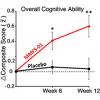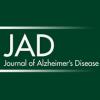9 December 2015
Singing is beneficial for memory and mood especially in early dementia
Researchers led by Dr. Teppo Särkämö at University of Helsinki, Finland have revealed that caregiver-implemented musical leisure activities, particularly singing, are cognitively and emotionally beneficial especially in the early stages of dementia. The findings could help improve dementia care and better target the use of music in different stages of dementia.
11 November 2015
Reproductive history and risk of cognitive impairment in elderly women: a cross-sectional study in eastern China
Researchers led by Professor Jun-Fen Lin at Zhejiang Provincial Center for Disease Control and Prevention have found that reproductive history, an important modifier of estrogen exposure across women’s lifetime, is associated with risk of cognitive impairment in postmenopausal women. These findings are published in the Journal of Alzheimer’s Disease.
10 November 2015
Changes in humour may be an early sign of dementia
Researchers at University College London (UCL) have revealed that a change in sense of humour could be an early sign of dementia. The findings could help improve dementia diagnosis, by highlighting changes not commonly thought to be linked to the condition. The study was funded by Alzheimer’s Research UK, the Wellcome Trust, Medical Research Council (MRC) and NIHR Queen Square Dementia Biomedical Research Unit. The research was published in the Journal of Alzheimer’s Disease on 10 November 2015.
9 November 2015
Blood test detects pre-Alzheimer’s in Mexican-Americans with 96 percent accuracy
A blood test developed at the University of North Texas Health Science Center detects pre-Alzheimer’s disease in asymptomatic Mexican-Americans with 96 percent accuracy. The test used blood samples provided by participants in the university’s Health & Aging Brain Among Latino Elders (HABLE) study. Hundreds of older Mexican-American residents from the Fort Worth area have participated in this study, which seeks to understand aging in this underserved population.
28 October 2015
UCI study finds jet lag-like sleep disruptions spur Alzheimer’s memory, learning loss
Chemical changes in brain cells caused by disturbances in the body’s day-night cycle may be a key underlying cause of the learning and memory loss associated with Alzheimer’s disease, according to a University of California, Irvine study. The research on mice, led by UCI biomedical engineering professor Gregory Brewer, provides the first evidence that circadian rhythm-altering sleep disruptions similar to jet lag promote memory problems and chemical alterations in the brain.
28 October 2015
Neurocentria’s Lead Compound MMFS-01 Improves Brain Age by 9 Years in Human Study on Older Adults
Neurocentria Inc., a clinical-stage biopharmaceutical company developing therapeutics to enhance brain function and correct cognitive impairment, announced the successful completion of a human study demonstrating that the company’s lead compound significantly reversed cognitive impairment in subjects 50 to 70 years old. The results have been published in the peer-reviewed Journal of Alzheimer's Disease.
22 October 2015
Use of benzodiazepines and related drugs common around Alzheimer's diagnosis
Benzodiazepines and related drugs are initiated frequently in persons with Alzheimer's disease already before the diagnosis, and their use becomes even more common after the diagnosis, shows a recent study from the University of Eastern Finland. Benzodiazepines and related drugs are used as a sleep medication and for anxiolytic purposes. These drugs were initiated more frequently in persons with Alzheimer's disease than in persons not diagnosed with AD. Compared to persons not diagnosed with AD, it was three times more likely for persons with Alzheimer's disease to initiate benzodiazepine use after the diagnosis, and benzodiazepines were most commonly initiated six months after the diagnosis.
20 October 2015
Research study validates Neuroreader for accurate and fast measurement of brain volumes
A new neuroimaging software, Neuroreader, was shown to be as accurate as traditional methods for detecting the slightest changes in brain volume, and does so in a fraction of the time, according to a research study published in the Journal of Alzheimer’s Disease this month. The research validates the software program that can be used for measuring hippocampal volume, a biomarker for detecting Alzheimer’s Disease.
19 October 2015
No Increased Dementia Risk Found in Diagnosed Celiac Patients
A new and comprehensive study by investigators at the Celiac Disease Center at Columbia University Medical Center has found that celiac patients are at no increased risk for dementia before or after their diagnosis of celiac disease. “Patients coming to our center have long described ‘brain fog,’ and it appears that gluten can cause cognitive effects in some individuals with and without celiac disease,” said Peter Green, MD, the Phyllis and Ivan Seidenberg Professor of Medicine at Columbia University and the director of the Celiac Disease Center. “However, we didn’t know if these effects have long-term consequences in the form of increased risk of dementia.”
6 October 2015
Women with Alzheimer’s-related Gene Lose Weight More Sharply after Age 70
Researchers led by Deborah Gustafson, PhD, MS, professor of neurology at SUNY Downstate Medical Center, have shown that women with a gene variant (APOEe4 allele) associated with Alzheimer’s disease experience a steeper decline in body mass index (BMI) after age 70 than those women without the version of the gene, whether they go on to develop dementia or not. The finding adds to a body of evidence suggesting that body weight change may aid in the diagnosis and management of Alzheimer's disease.
















